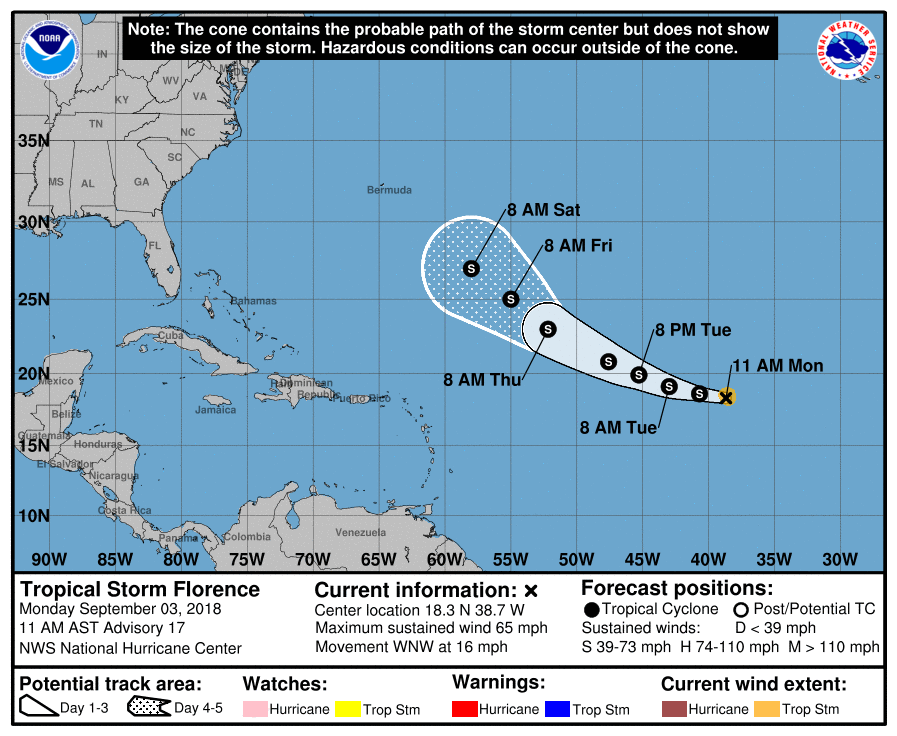
It's too soon for the U.S. East Coast to forget about Florence. With attention shifted toward rapidly developing Tropical Storm Gordon along the Gulf Coast, hurricane forecasters are now keeping a closer eye on Tropical Storm Florence, with the latest models showing the storm could threaten the eastern U.S. in a week or so, and it could be at hurricane strength.
"The window may open for Florence to intensify into a hurricane later in the week or next weekend," AccuWeather meteorologist Kristina Pydynowski reported today.
"By the middle of the week, Florence will once again move over some warmer water," AccuWeather senior meteorologist Rob Miller said. "Wind shear will also progressively lessen, which may allow Florence to strengthen."
As recently as Sunday, Florence wasn't much of a concern, since hurricane forecast models showed that Tropical Storm Florence's track was most likely to veer north into the Atlantic, floating away from the U.S. out to sea. Tropical Storm Florence's forecast path could change, however, since models on Monday began to show a different possibility. Some models showed the storm morphing into Hurricane Florence later this week, and some showed the storm veering close to the U.S. East Coast.
Taking the ECMWF EPS scenarios for Tropical Storm #Florence, there are more members supporting an East coast impact in 7-10days. The weaker intensity trends in the models is a big reason why Florence is tracking further west than what earlier cycles showed.
— MJVentrice (@MJVentrice) September 3, 2018
"Taking the ECMWF EPS scenarios for Tropical Storm #Florence, there are more members supporting an East coast impact in 7-10 days," tweeted Michael Ventrice, meteorological scientist and software engineer at the Weather Company. "The weaker intensity trends in the models is a big reason why Florence is tracking further west than what earlier cycles showed."
Ventrice noted there was still considerable uncertainty regarding Florence and engagement with the U.S. East Coast, and that at seven to 10 days away it is "too early" to "proclaim landfall and U.S. impacts."
Still, the latest models make Florence worth watching.
"This all said, things are evolving in a way which supports a closer track to the East Coast states than last week," Ventrice tweeted Monday.
As of late Monday morning, the National Hurricane Center noted a wide variance in forecast models for Florence and said it was sticking with "the middle of the guidance."
"Florence will be steered generally west-northwestward for the next 72 hours by the Atlantic subtropical ridge, followed by a northwestward turn at days 4 and 5," the NHC said in a Florence update Monday. "While there is large spread in the guidance between the HWRF on the right and the UKMET on the left, the GFS, ECMWF, and their ensemble means are more tightly clustered near the middle of the guidance envelope."
Forecasters with AccuWeather agreed, however, that Florence could threaten the U.S. East Coast in a week or more. First, the storm could brush or strike Bermuda.
"There is concern that Florence may get steered closer to Bermuda around Monday, Sept. 10—the peak of hurricane season in the Atlantic," according to the latest forecast update from AccuWeather. "Florence's strength and proximity to the island nation at this time will determine the risk of wind damage, flooding and storm surge flooding if this scenario pans out.
"After nearing Bermuda, Florence may attempt to approach the eastern United States later that week."
If not, the other, expected scenario will play out, and Florence will be "picked up by a non-tropical storm and carried northeastward toward Iceland, the British Isles or western Europe around mid-September," according to AccuWeather.
Uncommon Knowledge
Newsweek is committed to challenging conventional wisdom and finding connections in the search for common ground.
Newsweek is committed to challenging conventional wisdom and finding connections in the search for common ground.
About the writer
To read how Newsweek uses AI as a newsroom tool, Click here.








